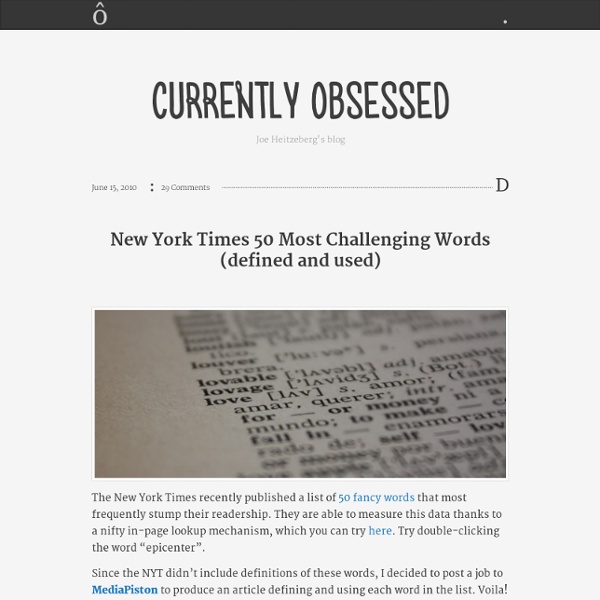Wordiness, Wordiness, Wordiness List
absolutely essential = essential aforementioned = DELETE a bigger/greater/higher/larger degree of = more
Workaholics
This website would like to remind you: Your browser (Firefox 17) is out of date. Update your browser for more security, comfort and the best experience on this site. ComedyCentral Menu ComedyCentral Workaholics Add to favorites Added to favorites
Liberalism is socialism, and socialism is big government
Myth: Liberalism is socialism, and socialism is big government. Fact: Liberals believe in private ownership of the means of production; socialists, public. Summary Modern American liberals are democratic capitalists. That is, they believe that private capitalist individuals should own and control the means of production, as long as they operate within the democratic law.
CALLIHOO Writing Helps
Character Feelings You can describe your character's feelings in more exact terms than just "happy" or "sad." Check these lists for the exact nuance to describe your character's intensity of feelings.
A Handbook of Rhetorical Devices
Robert A. Harris Version Date: January 19, 2013 This book contains definitions and examples of more than sixty traditional rhetorical devices, (including rhetorical tropes and rhetorical figures) all of which can still be useful today to improve the effectiveness, clarity, and enjoyment of your writing. Note: This book was written in 1980, with some changes since. The devices presented are not in alphabetical order.
Color Synonyms [Archive] - Teenage Writers
For when you don't want to say 'black' forty times in one sentence. The stuff in perentheses in italics are kind of cliche and might want to be avoided. Remember to try looking the color up before using it, since most of these names are for different shades. Also, not all names are appropriate at all times.
Top 5 Books That Will Change How You Think!
Self education is vastly underrated! I came across this concept back in my early twenties, and got curious. I figured out that there was nothing that was stopping me more from learning apart from me.
20 Obsolete English Words that Should Make a Comeback
Photo: Katherine Hodgson If we all start using them, these words can be resurrected. DURING MY UNDERGRADUATE studies as a Linguistics major, one of the things that struck me most is the amazing fluidity of language. New words are created; older words go out of style. Words can change meaning over time, vowel sounds shift, consonants are lost or added and one word becomes another.
23 Psychological Life Hacks to get an Advantage
Have you always wondered about the subtle things you can do to totally improve the outcome of a situation? It is something that I have constantly been thinking about. After spending some time searching up on the subject I came across some incredible bits of advice from a reddit discussion.
25 Things You Should Know About Word Choice - StumbleUpon
1. A Series Of Word Choices Here’s why this matters: because both writing and storytelling comprise, at the most basic level, a series of word choices. Words are the building blocks of what we do. They are the atoms of our elements. They are the eggs in our omelets.
10 counter culture novels that will get you high on life
From the European Romantics of the 18th century avant-garde to the pre-WWI Bohemians, the world’s been struck by many a powerful counter-cultural movement. The one that’s closest to our hearts, though, spanned the mid-twentieth century, and was rooted in the USA: from the post-War 1940s right though to the early days of the 1970s, America was bombarded with hippies, flower-power, drop-outs, squatters, pacifist campaigners and (not least) feminists, each of them battling against the status-quo and the staid, conservative middle-classes. And what helped to stir this revolutionary stew? Why, books, of course! Writers were right there in the thick of it, scribbling literary rallying cries that we’re still hearing today. It’s hard to know where to start – Hunter S.



